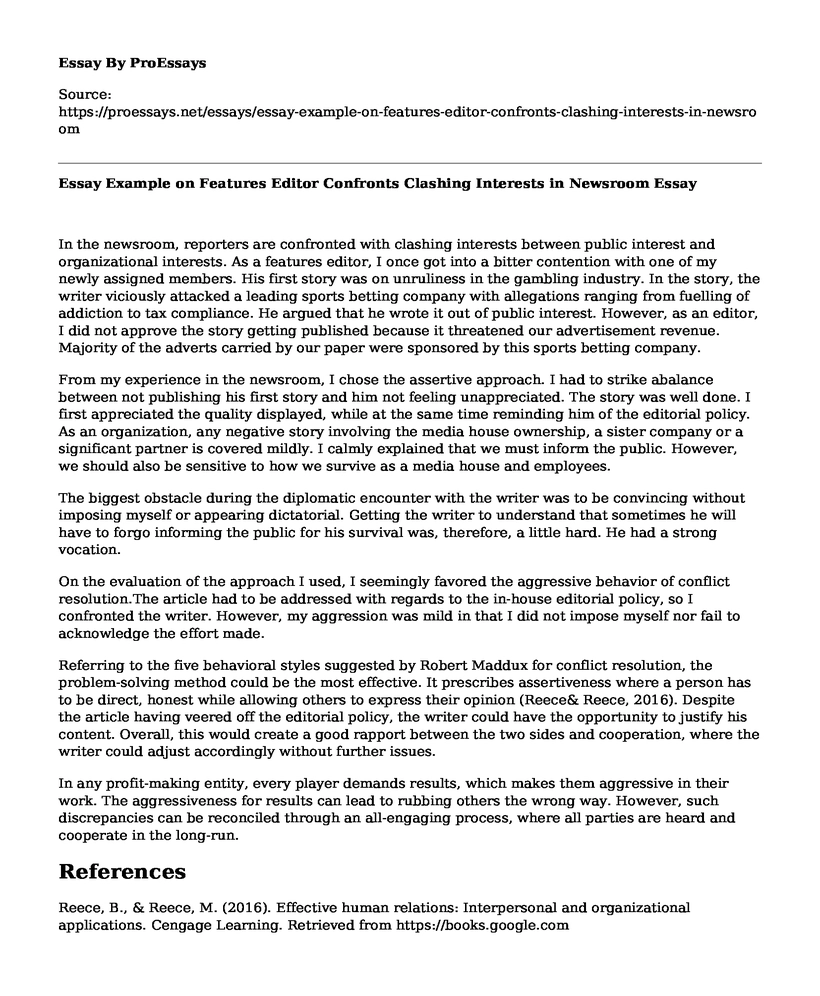In the newsroom, reporters are confronted with clashing interests between public interest and organizational interests. As a features editor, I once got into a bitter contention with one of my newly assigned members. His first story was on unruliness in the gambling industry. In the story, the writer viciously attacked a leading sports betting company with allegations ranging from fuelling of addiction to tax compliance. He argued that he wrote it out of public interest. However, as an editor, I did not approve the story getting published because it threatened our advertisement revenue. Majority of the adverts carried by our paper were sponsored by this sports betting company.
From my experience in the newsroom, I chose the assertive approach. I had to strike abalance between not publishing his first story and him not feeling unappreciated. The story was well done. I first appreciated the quality displayed, while at the same time reminding him of the editorial policy. As an organization, any negative story involving the media house ownership, a sister company or a significant partner is covered mildly. I calmly explained that we must inform the public. However, we should also be sensitive to how we survive as a media house and employees.
The biggest obstacle during the diplomatic encounter with the writer was to be convincing without imposing myself or appearing dictatorial. Getting the writer to understand that sometimes he will have to forgo informing the public for his survival was, therefore, a little hard. He had a strong vocation.
On the evaluation of the approach I used, I seemingly favored the aggressive behavior of conflict resolution.The article had to be addressed with regards to the in-house editorial policy, so I confronted the writer. However, my aggression was mild in that I did not impose myself nor fail to acknowledge the effort made.
Referring to the five behavioral styles suggested by Robert Maddux for conflict resolution, the problem-solving method could be the most effective. It prescribes assertiveness where a person has to be direct, honest while allowing others to express their opinion (Reece& Reece, 2016). Despite the article having veered off the editorial policy, the writer could have the opportunity to justify his content. Overall, this would create a good rapport between the two sides and cooperation, where the writer could adjust accordingly without further issues.
In any profit-making entity, every player demands results, which makes them aggressive in their work. The aggressiveness for results can lead to rubbing others the wrong way. However, such discrepancies can be reconciled through an all-engaging process, where all parties are heard and cooperate in the long-run.
References
Reece, B., & Reece, M. (2016). Effective human relations: Interpersonal and organizational applications. Cengage Learning. Retrieved from https://books.google.com
Cite this page
Essay Example on Features Editor Confronts Clashing Interests in Newsroom. (2023, Jan 29). Retrieved from https://proessays.net/essays/essay-example-on-features-editor-confronts-clashing-interests-in-newsroom
If you are the original author of this essay and no longer wish to have it published on the ProEssays website, please click below to request its removal:
- Argumentative Essay: How Does Legalizing Same Sex Marriages Impact Our Schools
- A Discussion on the Differences Between Equity and Equality
- Racial Classification Paper Example
- Paper Example on Chief Police and Community: Securing Relationships to End Injustice
- Paper Example on Grieving Parents: A Tragic Loss of a Child With Chronic Illness
- Paper Example on Nurse Julia Brown: Helping the Needy in Africa
- Differential Impact of Past Sexual Histories - Article Review Sample







